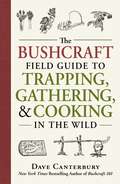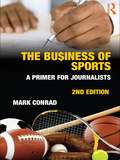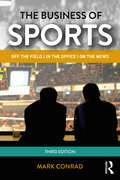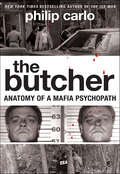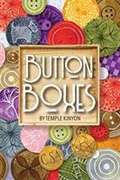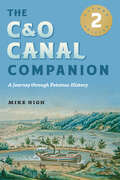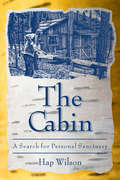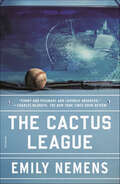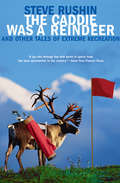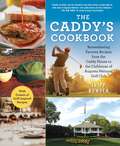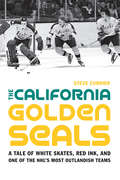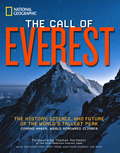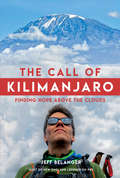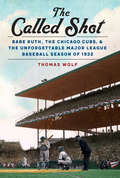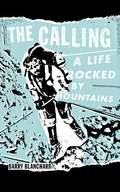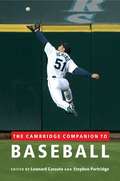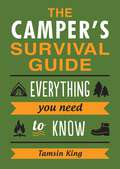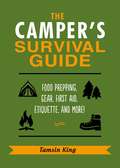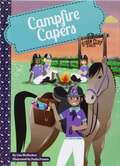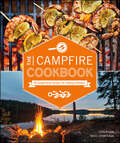- Table View
- List View
The Bushcraft Field Guide to Trapping, Gathering, and Cooking in the Wild: Bushcraft 101; Advanced Bushcraft; The Bushcraft Field Guide To Trapping, Gathering, And Cooking In The Wild; Bushcraft First Aid (Bushcraft)
by Dave CanterburyWhat to eat, where to find it, and how to cook it! Renowned outdoors expert and New York Times bestselling author Dave Canterbury provides you with all you need to know about packing, trapping, and preparing food for your treks and wilderness travels. Whether you're headed out for a day hike or a weeklong expedition, you'll find everything you need to survive--and eat well--out in the wild. Canterbury makes certain you're set by not only teaching you how to hunt and gather, but also giving you recipes to make while on the trail. Complete with illustrations to accompany his instructions and a full-color photo guide of plants to forage and those to avoid, this is the go-to reference to keep in your pack. The Bushcraft Field Guide to Trapping, Gathering, and Cooking in the Wild helps you achieve the full outdoor experience. With it, you'll be prepared to set off on your trip and enjoy living off the land.
The Business of Sports: A Primer for Journalists
by Mark ConradThis book explores the business aspect of sports with an orientation to those topics that are most relevant to journalists, providing the foundation for understanding the various parts of the sports business. Moving beyond sports writing, this text offers a distinct perspective on professional, college, and international sports organizations – structure, governance, labor issues, and other business factors within the sports community. Written clearly and compellingly, The Business of Sports includes cases (historical, current, and hypothetical) to illustrate how business concerns play a role in the reporting of sports. New features for the second edition include: updates throughout, including disciplinary policies throughout the major sports leagues expanded discussion of intellectual property issues and merchandising new sections on ethical issues in sports, aimed at journalists. Offering critical insights on the business of sports, this text is a required resource for sports journalists and students in sports journalism.
The Business of Sports: On the Field, in the Office, on the News
by Mark ConradThe Business of Sports provides a comprehensive foundation of the economic, organizational, legal and political components of the sports industry. Geared for journalism, communication and business students, but also an excellent resource for those working in sports, this text introduces readers to the ever-increasing complexity of an industry that is in constant flux. Now in its third edition, the volume continues to offer a wealth of statistics and case studies, up to date with the newest developments in sports business and focused on cutting-edge issues and topics, including the many changes in international sports and the role of analytics in decision-making and tax rules that have a major effect on athletes and teams.
The Business of the FIFA World Cup
by Simon ChadwickThe FIFA World Cup is arguably the biggest sporting event on earth. This book is the first to focus on the business and management of the World Cup, taking the reader from the initial stages of bidding and hosting decisions, through planning and organisation, to the eventual legacies of the competition. The book introduces the global context in which the World Cup takes place, surveying the history and evolution of the tournament and the geopolitical background against which bidding and hosting decisions take place. It examines all the key issues and debates which surround the tournament, from governance and corruption to security and the media, and looks closely at the technical processes that create the event, from planning and finance to marketing and fan engagement. Analysis of the Women’s World Cup is also embedded in every chapter, and the book also considers the significance of World Cup tournaments at age-group level. No sport business or management course is complete without some discussion of the FIFA World Cup, so this book is essential reading for any student, researcher or sport business professional looking to fully understand global sport business today.
The Butcher: Anatomy of a Mafia Psychopath
by Philip CarloThe New York Times bestselling author of Gaspipe and The Ice Man, Phillip Carlo returns with a hair-raising portrait of arguably the most depraved psychopath in the history of the Mafia, mob enforcer Tommy “Karate” Pitera. The Butcher tells the riveting true story of a hit man who loved his work too much—a maniac believed responsible for more than sixty remarkably brutal murders—whom even organized crime’s most cold-blooded assassins feared. Another riveting journey into the darkest corners of the underworld, Carlo’s The Butcher is destined to be a true crime classic alongside Wiseguys by Nicholas Pileggi and Underboss by Peter Maas.
The Button Boxes
by Temple KinyonWhat does a football-loving kid do with a couple of old wooden boxes and a pile of buttons? Andy Howell sure doesn't know, but his Grandma Lois gives him precisely that on his twelfth birthday. "They'll change your life and show you spectacular stories about our family's history," Lois tells him. But Andy wonders if she's just trying to coax him toward a future in the family tailoring business and away from his dream of becoming a famous football player. And when she urges him to sleep with the buttons to unlock their magical stories, he begins to think she's going crazy. He doesn't have time to mess with stupid buttons and boxes. All he can think about right now is how to get a good grade on his family tree project in history so he doesn't get benched by his coach and ridiculed by his teammates, who are also his friends. But when Lois suddenly ends up in the hospital with a mysterious ailment, Andy begins to wonder if the power of the buttons and boxes are the only things that can save her. If he learns the button's secrets and his family history, will it cure Lois? Andy doesn't know but frantically devises a plan to rescue her, risking trouble with his parents, teachers, friends, and worst of all, his coach. But is it too late?
The C&O Canal Companion: A Journey through Potomac History
by Mike HighAn indispensable guide to a regional treasure—now thoroughly updated and expanded.A comprehensive guide to one of America's unique national parks, The C&O Canal Companion takes readers on a mile-by-mile, lock-by-lock tour of the 184-mile Potomac River waterway and towpath that stretches from Washington, D.C., to Cumberland, Maryland, and the Allegheny Mountains. Making extensive use of records at the National Archives and the C&O Canal Park Headquarters, Mike High demonstrates how events and places along the canal relate to the history of the nation, from Civil War battles and river crossings to the frontier forts guarding the route to the West. Using attractive photographs and drawings, he introduces park visitors to the hidden history along the canal and provides practical advice on cycling, paddling, and hiking—all the information needed to fully enjoy the park's varied delights. Thoroughly overhauled and expanded, the second edition of this popular, fact-packed book features updated maps and photographs, as well as the latest information on lodgings and other facilities for hikers, bikers, and campers on weekend excursions or extended outdoor vacations. It also delves deeper into the history of the upland region, relaying new narratives about Native American settlements, the European explorers and traders who were among the first settlers, and the lives of slaves and free blacks who lived along or escaped slavery via the canal.Visitors to the C&O Canal who are interested in exploring natural wonders while tracing the routes of pioneers and engineers—not to mention the path of George Washington, who explored the Potomac route to the West as a young man and later laid out the first canals to make the river navigable—will find this guide indispensable.
The Cabin: A Search for Personal Sanctuary
by Hap WilsonOne hundred years ago, a young doctor from Cleveland by the name of Robert Newcomb, travelled north to a place called Temagami. It was as far north as one could travel by any modern means. Beautiful beyond any simple expletive, the Temagami wilderness was a land rich in timber, clear-water lakes, fast flowing rivers, mystery and adventure. Newcomb befriended the local Aboriginals — the Deep Water People — and quickly discovered the best way to explore was by canoe. Bewitched by the spirit of an interior river named after the elusive brook trout, Majamagosibi, Newcomb had a remote cabin built overlooking one of her precipitous cataracts. The cabin remained unused for decades, save for a few passing canoeists; it changed ownership twice and slowly began to show its age. The author discovered the cabin while on a canoe trip in 1970. Like Newcomb, Hap Wilson was lured to Temagami in pursuit of adventure and personal sanctuary. That search for sanctuary took the author incredible distances by canoe and snowshoe, through near death experiences and Herculean challenges. Secretly building cabins, homesteading and working as a park ranger, Wilson finally became owner of The Cabin in 2000. Artist, author and adventurer, Hap Wilson is perhaps best known for his ecotourism/travel guidebooks. He has led over 300 wilderness expeditions in Canada, and served as actor Pierce Brosnan’s personal outdoor trainer for the feature film Grey Owl. "This is a complex and fascinating story, beautifully told. At first, it draws us in because the author appears to be living the life we all dream of-a simpler life, close to nature, free from the stress and strain of our consumer culture. But the reality, with its myriad challenges, is what holds our attention and gives the book its substance." — Judith Ruan, Muskoka Magazine
The Cactus League: A Novel
by Emily NemensNamed a Best Book of 2020 by NPR and Lit Hub. A Los Angeles Times Bestseller. A New York Times Book Review Editors' Choice"In The Cactus League [Emily Nemens] provides her readers with what amounts to a miniature, self-enclosed world that is funny and poignant and lovingly observed." --Charles McGrath, The New York Times Book ReviewAn explosive, character-driven odyssey through the world of baseballJason Goodyear is the star outfielder for the Los Angeles Lions, stationed with the rest of his team in the punishingly hot Arizona desert for their annual spring training. Handsome, famous, and talented, Goodyear is nonetheless coming apart at the seams. And the coaches, writers, wives, girlfriends, petty criminals, and diehard fans following his every move are eager to find out why—as they hide secrets of their own.Humming with the energy of a ballpark before the first pitch, Emily Nemens's The Cactus League unravels the tightly connected web of people behind a seemingly linear game. Narrated by a sportscaster, Goodyear’s story is interspersed with tales of Michael Taylor, a batting coach trying to stay relevant; Tamara Rowland, a resourceful spring-training paramour, looking for one last catch; Herb Allison, a legendary sports agent grappling with his decline; and a plethora of other richly drawn characters, all striving to be seen as the season approaches. It’s a journey that, like the Arizona desert, brims with both possibility and destruction.Anchored by an expert knowledge of baseball’s inner workings, Emily Nemens's The Cactus League is a propulsive and deeply human debut that captures a strange desert world that is both exciting and unforgiving, where the most crucial games are the ones played off the field.
The Caddie Was a Reindeer: And Other Tales of Extreme Recreation
by Steve RushinSteve Rushin, a four-time finalist for the National Magazine Award, has been hailed as one of the best sportswriters in America. In The Caddie Was a Reindeer he circumnavigates the globe in pursuit of extreme recreation. In the Arctic Circle, he meets ice golfers. In Minnesota, he watches the National Amputee Golf Tournament, where one participant tells him, "I literally have one foot in the grave.” Along the way, Rushin meets fellow travelers like Joe Cahn, a professional tailgater who confesses aboard the RV in which he lives: "It’s wonderful to see America from your bathroom.” And even Rushin has logged fewer miles in pursuit of extreme recreation than Rich Rodriguez, a marathon roller-coaster rider who makes endless loops for entire summers on coasters around the world. The Caddie Was a Reindeer is a ride to everywhere: to south London (where Rushin downs pints with the King of Darts), to the Champs-Elysees (where the author indulges in "excessive nightclubbing” with World Cup soccer stars), and to Japan (where Rushin eats soba noodles with the world champion of competitive eating). Enlightening, hilarious, and unexpectedly heartwarming, this collection is not a body of work: it’s a body of play.
The Caddy's Cookbook: Remembering Favorite Recipes from the Caddy House to the Clubhouse of Augusta National Golf Club
by Tripp BowdenForty Delicious Recipes Inspired by the Links at Augusta! As a caddy at Augusta National Golf Club, Tripp Bowden learned many invaluable lessons about golf, life—and food. In The Caddy’s Cookbook, Bowden shares forty of his favorite recipes inspired by his life spent behind-the-scenes at Augusta. Complete with intrinsic, full-color photos, this book—certainly not standard by any cookbook terms—features surprising spins on table-friendly classics, such as Honey Baked Ham butter beans, caddy house gumbo, collard greens and pot liquor, deep fried pork chop sandwiches, New England clam chowder, lobster bisque, Clubhouse ice cream, toasted pound cake (also known as Mr. Roberts's Dessert), and Bowden's favorite beverage from the nineteenth hole. Along the way, Bowden contextualizes how and when he enjoyed some of these unexpected culinary delights as he details his unique caddy experiences and the lifelong friendships forged through food and golf. In doing so, he creates a real treat for golf lovers and food enthusiasts alike, with elements of unscripted humor reminiscent of the classic Caddyshack sprinkled and dashed throughout!
The California Golden Seals: A Tale of White Skates, Red Ink, and One of the NHL's Most Outlandish Teams
by Steve CurrierHockey has had its share of bizarre tales over the years, but none compares to the fascinating story of the California Golden Seals, a team that remains the benchmark for how not to run a sports franchise. From 1967 to 1978, a revolving door of players, apathetic owners, and ridiculous marketing decisions turned the Seals, originally based in Oakland, into hockey’s traveling circus. The team lost tons of money and games, cheated death more often than Evel Knievel, and left behind a long trail of broken dreams. Live seals were used as mascots, players wore skates that were painted white on an almost-daily basis, and draft picks were dealt away nonchalantly like cards at a poker game. One general manager was hauled in for questioning by mysterious men because he’d mismanaged a player contract, while one of the team’s goaltenders regularly spat tobacco juice at the feet of referees.The California Golden Seals examines the franchise’s entire mismanaged—but always interesting—history, from its ballyhooed beginnings as a minor-league champion in the 1960s to its steep slide into oblivion in the late 1970s after moving to Cleveland. Through a comprehensive season-by-season narrative and a section of definitive statistics, Currier brings to life the Seals’ entire history with lighthearted anecdotes, personal interviews, and statistics about hockey’s most infamous losing team.
The Call of Everest
by Conrad Anker Thomas Hornbein Bernadette McdonaldGripping and sumptuous, this is the definitive book on the history, mystique, and science of Mount Everest, including how climate change is impacting the world's tallest mountain. In 1963, the American Mount Everest Expedition made mountaineering history. It was the first American venture to successfully scale the legendary peak and the first successful climb up the hazardous West Ridge (a climb so difficult no one has yet repeated it). In 2012, adventurer Conrad Anker led a National Geographic/The North Face team up the mountain to enact a legacy climb. Environmental changes and overcrowding led to challenges and disappointments, but yet the mountain maintains its allure. Now, steely-eyed Anker leads a team of writers in a book designed to celebrate the world's most famous mountain, to look back over the years of climbing triumphs and tragedies, and to spotlight what has changed--and what remains eternal--on Mount Everest. Telltale signs of Everest's current state, never-before-published photography, and cutting-edge science expose the world's tallest peak--its ancient meaning, its ever-present challenges, and its future in a world of disappearing ice.From the Hardcover edition.
The Call of Kilimanjaro: Finding Hope Above the Clouds
by Jeff Belanger"My own journey to the summit of Kilimanjaro opened me to a life of adventure, and this book brought me right back to the slopes of that magical mountain. An honest and affirming tale of embracing the unknown and the transformative power of nature, Jeff's journey is an invitation to all of us to get outside our comfort zone, see the world, and let it change us." —Josh Gates, Explorer, Host of Discovery's Expedition Unknown An honest and engaging account of one amateur hiker's journey to spiritual transformation as he climbs to the summit of Mount Kilimanjaro. After his brother-in-law Chris passed away, author Jeff Belanger made the decision to take the trip of a lifetime, both in honor of Chris and in pursuit of clarity about his own life and goals. The Call of Kilimanjaro is a day-by-day record of Belanger's ascent to the peak of Africa's highest mountain. By turns contemplative and irreverent, joyful and thoughtful, boyish and wise, this is a book for all ages - from 10 to 100 - and a memoir for armchair travelers with an interest in spirituality. By example, Belanger teaches us to take stock of our accomplishments, eye the lofty goals we've placed in front of ourselves, and push higher than we've ever dared, turning an honest eye toward past, present, and future, through the end of life and beyond.
The Called Shot: Babe Ruth, the Chicago Cubs, and the Unforgettable Major League Baseball Season of 1932
by Thomas WolfIn the summer of 1932, at the beginning of the turbulent decade that would remake America, baseball fans were treated to one of the most thrilling seasons in the history of the sport. As the nation drifted deeper into the Great Depression and reeled from social unrest, baseball was a diversion for a troubled country—and yet the world of baseball was marked by the same edginess that pervaded the national scene. On-the-field fights were as common as double plays. Amid the National League pennant race, Cubs&’ shortstop Billy Jurges was shot by showgirl Violet Popovich in a Chicago hotel room. When the regular season ended, the Cubs and Yankees clashed in what would be Babe Ruth&’s last appearance in the fall classic. After the Cubs lost the first two games in New York, the series resumed in Chicago at Wrigley Field, with Democratic presidential candidate Franklin Roosevelt cheering for the visiting Yankees from the box seats behind the Yankees&’ dugout. In the top of the fifth inning the game took a historic turn. As Ruth was jeered mercilessly by Cubs players and fans, he gestured toward the outfield and then blasted a long home run. After Ruth circled the bases, Roosevelt exclaimed, &“Unbelievable!&” Ruth&’s homer set off one of baseball&’s longest-running and most intense debates: did Ruth, in fact, call his famous home run? Rich with historical context and detail, The Called Shot dramatizes the excitement of a baseball season during one of America&’s most chaotic summers.
The Calling
by Barry BlanchardWith heart-pounding descriptions of avalanches and treacherous ascents, Barry Blanchard chronicles his transformation from a poor Metis (half-breed) kid from the wrong side of the tracks to one of the most respected alpinists in the world. He describes early climbs attempted with nothing to guide him but written trail descriptions and the cajones of youth. He slowly acquires the skills, equipment and partners necessary to tackle more and more difficult climbs, farther and farther afield: throughout the Canadian Rockies, into Alaska and the French Alps and on to Everest, Peru, and the challenging mountains in Pakistan. From each he learns lessons that only nature and extreme endeavor can teach. This is the story of the culture of climbing in the days of punk rock and rock 'n' roll, accompanied by the rhythm of adrenaline and the arrogance of youth. It is a portrait of the power of the mountains to lift us - physically, emotionally, intellectually, spiritually - and the depths of relationships based on total trust in the person at the other end of a rope. Includes climbs with renowned alpinists such as Kevin Doyle, Mark Twight, David Cheesmond and Ward Robinson. 432 pages with photos and a playlist.
The Cambridge Companion to Baseball
by Leonard Cassuto Stephen PartridgeBaseball is much more than a game. As the American national pastime, it has reflected the political and cultural concerns of US society for over 200 years, and generates passions and loyalties unique in American society. This Companion examines baseball in culture, baseball as culture, and the game's global identity. Contributors contrast baseball's massive, big-business present with its romanticized origins and its evolution against the backdrop of American and world history. The chapters cover topics such as baseball in the movies, baseball and mass media, and baseball in Japan and Latin America. Between the chapters are vivid profiles of iconic characters including Babe Ruth, Ichiro and Walter O'Malley. Crucial moments in baseball history are revisited, ranging from the 1919 Black Sox gambling scandal to recent controversies over steroid use. A unique book for fans and scholars alike, this Companion explains the enduring importance of baseball in America and beyond.
The Cambridge Companion to Baseball
by Leonard Cassuto Stephen PartridgeBaseball is much more than a game. As the American national pastime, it has reflected the political and cultural concerns of US society for over 200 years, and generates passions and loyalties unique in American society. This Companion examines baseball in culture, baseball as culture, and the game's global identity. Contributors contrast baseball's massive, big-business present with its romanticized origins and its evolution against the backdrop of American and world history. The chapters cover topics such as baseball in the movies, baseball and mass media, and baseball in Japan and Latin America. Between the chapters are vivid profiles of iconic characters including Babe Ruth, Ichiro and Walter O'Malley. Crucial moments in baseball history are revisited, ranging from the 1919 Black Sox gambling scandal to recent controversies over steroid use. A unique book for fans and scholars alike, this Companion explains the enduring importance of baseball in America and beyond. Read Leonard Cassuto's article 'Baseball and the Business of American Innocence' in the Chronicle of Higher Education.
The Cambridge Companion to Cricket
by Anthony Bateman Jeffrey HillFew other team sports can equal the global reach of cricket. Rich in history and tradition, it is both quintessentially English and expansively international, a game that has evolved and changed dramatically in recent times. Demonstrating how the history of cricket and its international popularity is entwined with British imperial expansion, this book examines the social and political impact of the game in a variety of cultural sites: the West Indies, India, Pakistan, Sri Lanka, South Africa, Australia and New Zealand. An international team of contributors explores the enduring influence of cricket on English identity, examines why cricket has seized the imagination of so many literary figures and provides profiles of iconic players including Bradman, Lara and Tendulkar. Presenting a global panoramic view of cricket's complicated development, its unique adaptability and its political and sporting controversies, the book provides a rich insight into a unique sporting and cultural heritage.
The Cambridge Companion to Football
by Rob Steen Jed Novick Huw Richards Rob Steen Jed NovickFootball is the world's most popular sport. It is a cultural phenomenon and a global media spectacle. For its billions of fans, it serves as a common language. But where does its enduring popularity come from? Featuring essays from prominent experts in the field, scholars and journalists, this Companion covers ground seldom attempted in a single volume about football. It examines the game's oft-disputed roots and traces its development through Europe, South America and Africa, analysing whether resistance to the game is finally beginning to erode in China, India and the United States. It dissects the cult of the manager and how David Beckham redefined sporting celebrity. It investigates the game's followers, reporters and writers, as well as its most zealous money makers and powerful administrators. A valuable resource for students, scholars and general readers, The Cambridge Companion to Football is a true and faithful companion for anyone fascinated by the people's game.
The Cambridge Companion to Horseracing
by Rebecca CassidyPeople have been racing horses for thousands of years, all over the world. Yet horseracing is often presented as an English creation that was exported, unaltered, to the colonies. This Companion investigates the intersection of racing and literature, art, history and finance, casting the sport as the product of cross-class, cosmopolitan and international influences. Chapters on racing history and the origins of the thoroughbred demonstrate how the gift of a fast horse could forge alliances between nations, and the extent to which international power dynamics can be traced back to racetracks and breeding sheds. Leading scholars and journalists draw on original research and firsthand experience to create portraits of the racetracks of Newmarket, Kentucky, the Curragh, and Hunter Valley, exposing readers to new racing frontiers in China and Dubai as well. A unique resource for fans and scholars alike, reopening essential questions regarding the legacy and importance of horseracing today.
The Camper's Survival Guide: Everything You Need to Know About Camping
by Tamsin KingTips and ideas for wild nights in the woodsWhether you're a seasoned camper or it’s your first time sleeping under the stars, this pocket-sized book, packed with tips and advice on what gear you need, where to pitch up, how to perform basic first aid and much, much more, will be your essential guide to surviving and having fun in the great outdoors.
The Camper's Survival Guide: Skills, Hacks, First Aid Advice, Gear, Etiquette, and Everything Else You Need to Know About Camping
by Tamsin KingPreparing for your next trip to the outdoors? Not really sure what to pack or how to spend your time? This woodsy guide is for you! With this perfect handbook, you’ll never be at a loss for what to do both before and during your camping trip. You’ll not only learn about packing, etiquette, wildlife, rules and regulations and more, but will also be inspired with perfect camping locations from all over the United States and Europe, as well as camping words of wisdom to help get you in the mindset. <p> Whether you're a seasoned camper or it’s your first time sleeping under the stars, The Camper’s Survival Guide, packed to the brim with tips and advice, will be your essential guide to surviving and having fun in the great outdoors.
The Campfire Capers (Storm Cliff Stables Series)
by Lisa MullarkeyAvery, Bree, Esha, and Jaelyn—the Core Four are ready for the perfect summer at Storm Cliff Stables! No campfire is complete without scary stories, and Esha is convinced hers will be the best one ever. Her tale of a thieving ghost spooks everyone, so Esha starts helping the story along by becoming a thief herself. But when Avery's horseshoe necklace goes missing for real, things get out of hand. Will Esha be able to tell the truth? Will her friends ever forgive her? Aligned to Common Core standards and correlated to state standards. <p>Calico is an imprint of Magic Wagon, a division of ABDO.
The Campfire Cookbook: 80 Imaginative Recipes for Cooking Outdoors
by Viola Lex Nico StanitzokThe ultimate cookbook for al fresco eating, with more than 80 recipes for cooking outdoors.Rustle up your choice of sweet and savory dishes for breakfast, lunch, and dinner. Alongside traditional campfire favorites such as bbq chicken, corn on the cob, and kebabs, you'll find recipes for stuffed flatbreads, gnocchi, and even apricot cakes in a jar. With step-by-step instructions and evocative photography, the recipes are easy to follow.Each recipe has a symbol that tells you the best way to cook it, be it an open fire, grill, or camping stove. As well as outdoor cooking hacks and clever tips, you'll find checklists of camping essentials, ideas for using local produce, and basic recipes for camping must-haves such as bbq sauce and ketchup, plus new favorites like dukkah.Outdoor cooking can be magical, so break out of the kitchen, light your fire, and enjoy delicious recipes from The Campfire Cookbook - the perfect culinary companion for any camping trip or outdoor cooking.
